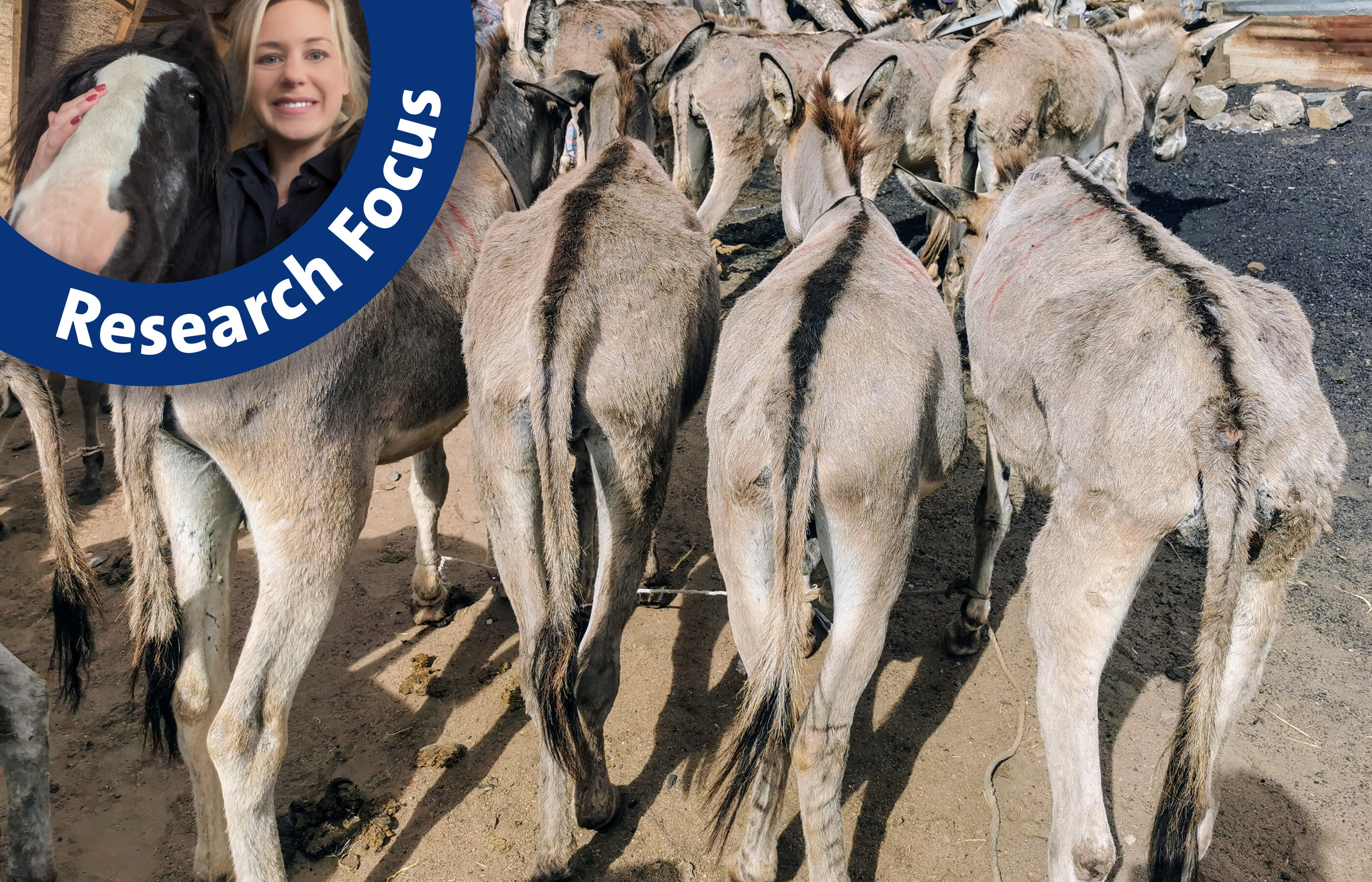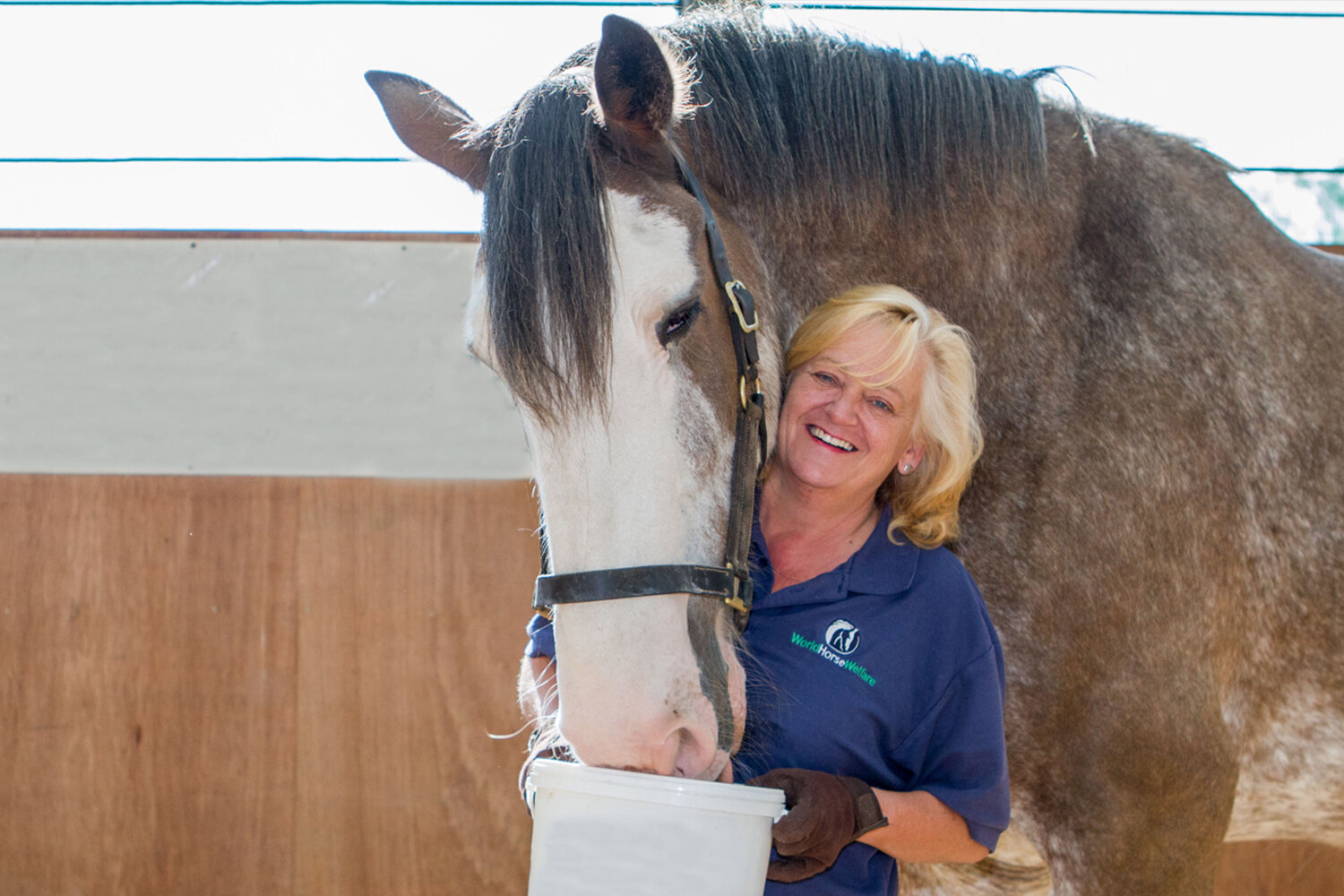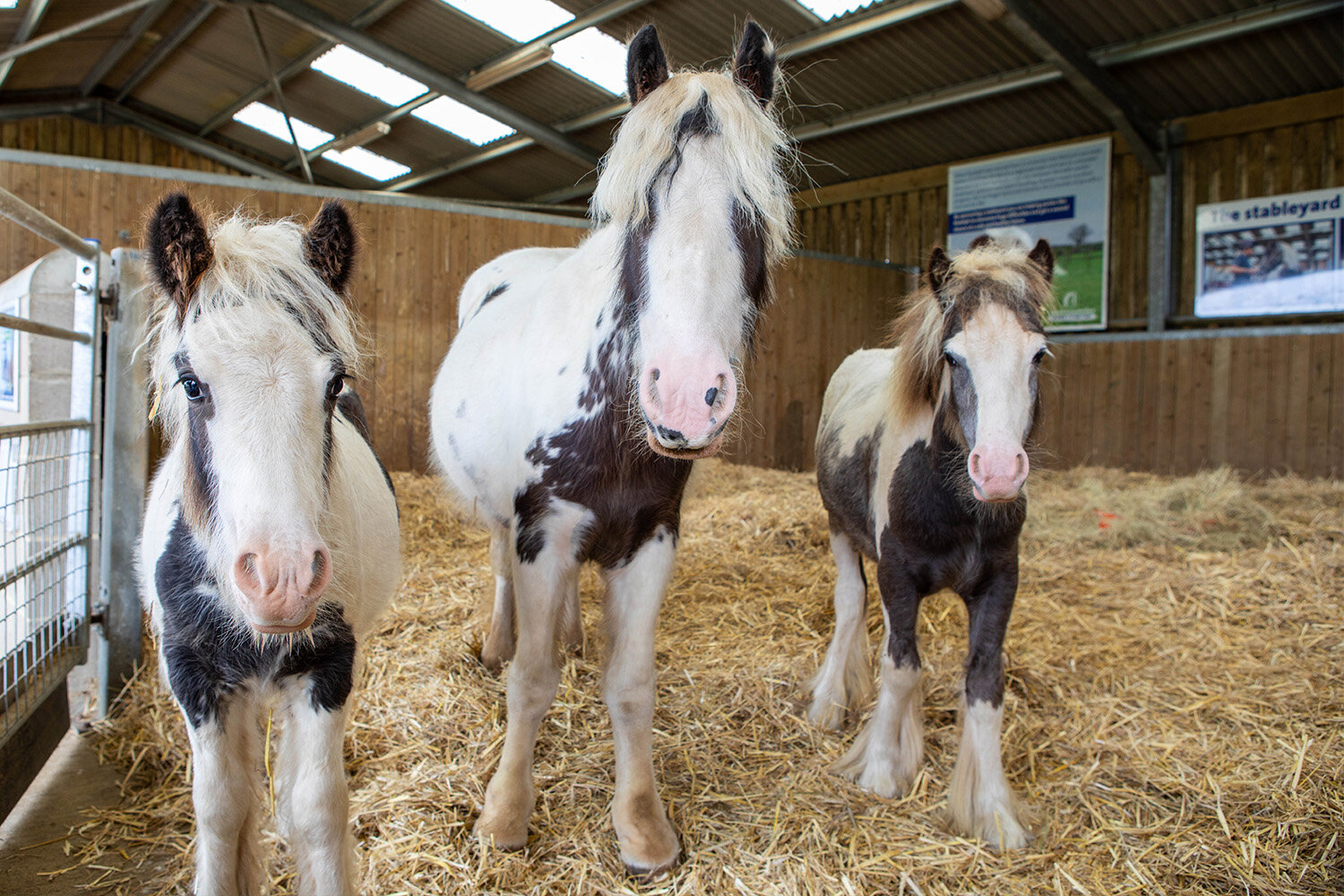The need to improve equine welfare at slaughter
A look inside our much-needed research to inform improved practices worldwide.
Posted on 18/07/2025

Our charity believes in using an evidence-based approach to protect equine welfare globally and one way we achieve this is by commissioning our own research to help tackle the most important issues facing horses today.
While progress continues to be made in safeguarding equine welfare around the world, concerns remain about how horses, donkeys, and mules are treated during slaughter. It’s estimated that around 5.5 million horses and 2 million donkeys are slaughtered worldwide each year – but because this trade is often underregulated, the actual numbers may be even higher.
The idea of horse slaughter unsurprisingly evokes strong emotions in many and acknowledging this reality can be difficult. However, from a welfare perspective, it is vital to ensure that when slaughter does occur, it is carried out with the highest possible standards of care, compassion and respect. One of the key issues is that many slaughter practices for equids were originally designed for cattle and other species. These methods don’t always take into account the unique needs and behaviours of equids, and therefore can compromise their welfare.
We therefore wanted our research to tackle this head on so in 2021 we launched a major research programme to improve the welfare of horses, donkeys and mules at slaughter. This involved commissioning a PhD in ‘Equid Welfare at Slaughter’ at the Royal Veterinary College which was subsequently awarded to Kate Fletcher.
Following years of research, dedicated fieldwork and analysis, Kate has now submitted her thesis on ‘Equid Welfare at Slaughter: Ante-mortem assessment and the pathophysiology of slaughter and stunning methods’. Her investigations and data collection have taken her around the world to identify key gaps in knowledge and conduct new studies. By developing practical, evidence-based guidance tailored specifically to equids, the project aims to support the implementation of more humane and welfare-focused practices in slaughterhouses worldwide.
With her full thesis having been submitted for examination, Kate is now putting the finishing touches on a set of guidelines and recommendations for equine welfare at slaughter. This guidance is designed to be adaptable across countries, balancing universal welfare standards with local context.
Kate’s findings are not only confined to her thesis pages. She has already published four peer-reviewed papers, spoken at numerous conferences and has helped to influence potential changes to slaughter regulation both in the UK and across the European Union.
We caught up with Kate to find out a bit more about her research first-hand.
Tell us a bit about yourself and your background…
I started my career on the frontline of animal welfare as an RSPCA Inspector, and for almost a decade, investigated cruelty and neglect towards all animals including horses. Towards the end of my time at the RSPCA I completed an MSc in Equine Behaviour, Performance and Training through the University of Portsmouth and was then offered a job as Senior Manager for Global Animal Welfare at Brooke (Action for Working Horses and Donkeys). This gave me more of an insight into the challenges faced by equids across the world, including at the end of their lives.
Why did you apply to take on this PhD?
I’d learned a lot at Brooke about the unregulated slaughter of equids in low-middle income countries and I was keen to investigate this further and play an active role in addressing this global issue. From my time as an RSPCA Inspector, I also had an understanding of the importance of a humane death for animals and of introducing appropriate species-specific policy and legislation that is based on robust evidence. My MSc dissertation focused on the effective communication of animal welfare science through Human Behaviour Change tools to be practically applied within the equestrian industry, and I am hugely passionate about stakeholder collaboration to ensure that science makes positive, sustainable changes to animal’s lives.
Having decided immediately after completing my MSc that I wanted to pursue a PhD, the project with World Horse Welfare through the Royal Veterinary College came up very opportunistically towards the end of my fixed-term contract at Brooke. It ticked all the boxes I wanted out of a PhD – an experienced, expert supervisory team, the chance to work with an incredible charity like World Horse Welfare, and a project that was based on gathering research to then introduce practical guidance for the industry. I knew how worthwhile and much-needed the research on this topic would be and how it could lead to substantial improvements for equids at slaughter. I applied and was lucky enough to be successful. I knew it would be a tough topic to research, but I’ve never been one to take the easy road or shy away from difficult things.
Can you explain what your research has involved and where has it taken you?
The project has involved collecting evidence of the different practices, procedures and methods used for the slaughter of equids in different countries. It has focused on what happens to equids once they arrive at the abattoir through to the way in which they are stunned or slaughtered. This has meant I have investigated pre-slaughter handling and lairage conditions, along with different methods of slaughter including penetrative Captive Bolt Gun, Blunt Force Trauma and slaughter without stunning. This has involved behavioural assessment at the time of stunning or slaughter, alongside carcass examination and gross brain pathology. I have also conducted structured interviews with slaughter personnel. In geographical terms, my research has taken me around the UK, across Europe, to Mexico, and to Ghana in West Africa.
What were your expectations when you started on your PhD journey?
I’m not sure what my expectations quite looked like when I first started my PhD but I would say it has exceeded them and also thrown them out of the water! In terms of my personal expectations, I expected to learn a lot, and I have learned above and beyond anything I expected. My scientific research skills have developed and strengthened considerably but I have also strengthened personal skills such as patience, tenacity, empathy and organisational skills. I am definitely not the same person I was four years ago when I started this project!
In terms of my expectations for the research itself, I think I expected that we would find one place, particularly in a more regulated country, which could almost be used as an example of how equid slaughter is done in the best possible way. I wasn’t expecting to find the scale of welfare compromises, even in countries where we have the resources and knowledge to know better and do better. However, on the other hand, it was difficult to see the challenges faced by those in low-middle income countries, including Ghana and Mexico.
Through your travels, what were the most surprising and reassuring things you saw?
One of the most reassuring things was the level of interest and engagement in the project from the slaughter personnel in every country I visited. That’s not to say that there weren’t difficulties with accessing abattoirs or slaughter points, with it being quite a sensitive, contentious and controversial issue in some countries, but there was also a heartening enthusiasm to learn and to identify ways the slaughter process could be improved.
This was especially clear in Ghana, despite the slaughter workers there lacking so many things we take for granted, like running water, education, training, personal protective equipment, and appropriate resources. One of the most memorable things I witnessed there was where one of the slaughter workers, who was a young child maybe aged 9 or 10 years old, had seen my supervisor and I assessing donkeys immediately post-slaughter (through ventral neck incision, without prior stunning) to determine when they lost consciousness and we would check their eyes for reflexes that indicate potential consciousness. This child’s friend slaughtered a donkey which was not one included in our sample, and I saw the child then tap around the donkey’s eyes as he had seen us doing. It was incredible how interested they were in what we were doing and how perceptive they were, even if I hadn’t explained to that child why I was doing it. Some of the children we met in Ghana were initially quite wary of us, as they’d never met westerners before, and then we turn up with our clipboards and dictaphones, but by the end of my time there my supervisor and I were making them all balloons out of our latex examination gloves and drawing animal faces on them and we were being trailed around by eager children who wanted to help us.
It gave me hope for the next generation and incentivised me to find ways in which we can engage with and support them more to help them develop more welfare-friendly ways of conducting their work, even with their limited resources, as improving donkey slaughter there might also benefit their lives too.
What has been the most challenging part of this project?
I think that doing a PhD is riddled with challenges for anyone. It forces you to confront your weaknesses, become comfortable with criticism and learn patience and humility. However, on top of all that, the hardest part of this project has undoubtedly been bearing witness to indescribable suffering inflicted upon animals and being powerless to step in and help. A lot of the time, I felt like a passive observer to animal’s being killed in an inhumane or sub-optimal way and as a researcher it is not my job to intervene as it would not only look unprofessional and be dangerous but would also compromise my research, which would not then help other animals in the longer-term. However, this was often really challenging.
There are several memorable occasions that will potentially haunt me forever. However, I remember my supervisor telling me after one particularly traumatic event that he would be more worried if I wasn’t affected by it, and that stuck in my mind. I would never want to become desensitised to animals suffering as trying to limit their suffering is what drives me, although I’ve had to learn a way of maintaining professionalism and a slight poker face. I do this by focusing on gathering the data, in the knowledge of how important this research is, and I am driven to do this project knowing how much it could potentially make a difference to, if not the animal in front of me at the time, hopefully to millions more equids in the future.
What has been the most rewarding aspect of your research?
Aside from the little moments like I mentioned in Ghana, which give me so much hope, seeing my research make practical change is hugely rewarding. Already, this research has led to proposed policy and legislative changes in the UK and EU, which could then lead to improvements at slaughter for equids around the world. Publishing the research as I’ve gone through the PhD journey has been great in terms of raising awareness of the project and of the improvements that need to be made to equids at slaughter. I’m also fortunate enough to have presented at several international conferences.
How important do you feel this project is and how will it contribute to improved equine welfare?
I have always believed that this project is so important to improving equid welfare at slaughter. My passion for that is what has driven me throughout my PhD. With millions of equids slaughtered across the world each year, finding ways in which this can be done more effectively and where their welfare can be safeguarded from the moment they arrive at the abattoir to the time in which they are slaughtered is vital.
This project has been groundbreaking in gathering seminal evidence into how we can improve this process, potentially improving the welfare of so many equids around the world. I am so grateful to World Horse Welfare for recognising how much this research is needed and supporting me in doing it.
What is next?
I would love to see my PhD research have tangible, lasting impact through policy and legislative improvements. To assist with this, I am developing guidelines with World Horse Welfare that explore how my research can be practically applied to improve equid welfare at slaughter. I also want to support lower-income countries to be able to feasibly apply the research on the ground and help communities find the resources to achieve sustainable behaviour change by utilising a One Health/One Welfare approach.
I am also now in a new role, working for The Donkey Sanctuary, enabling me to continue to contribute to equine welfare on a global scale, by influencing policy through advocacy, scientific research and stakeholder engagement, and continuing to call for improved equine welfare standards globally.
It’s an exciting time for the project, and we’re looking forward to sharing the next chapter once the guidelines are published.
This work is a crucial contribution to advancing the welfare of equids at slaughter globally—and Kate’s dedication to the cause is something we’re incredibly proud of. Alongside her thesis work, Kate continues to contribute to the wider veterinary and welfare community. She remains active as the postgraduate representative on RVC’s Clinical Research Ethical Review Board and is a member of the Donkey Network, where she liaises with NGO partners and other welfare professionals.
By generating robust, evidence-based data, our charity is better equipped to lobby governments for stronger welfare protections and provide practical training to drive real-world improvements.
Topics
Related Blog Posts

We find out the latest news on Equine Grass Sickness
Belwade Farm Rescue and Rehoming Centre Manager Eileen Gillen shares insights from a conference on the complex disease.
Recommended News Articles

Equestrians, politicians, academics and a zookeeper set to explore the world ‘Through the horse’s eyes’
Our 2025 Conference will take place on 21st November, welcoming speakers and attendees from around the globe.

New laminitis research shows gaining weight is a risky business
This newly published research provides compelling evidence that laminitis developed significantly more often after horses and ponies gained weight rather than when they lost or maintained weight.

Inspirational and ‘incredibly brave’ mare adopts orphan foal alongside her own.
An emaciated mare rescued to our Norfolk Rescue and Rehoming Centre has become the inspirational face behind our Christmas appeal.
Enjoy reading stories like this?
Join over 65,000 other horse lovers and sign up for our email newsletter

Join over 65,000 other horse lovers and sign up for our email newsletter
Sign me up now